8+ Sample Property Investment Plan
-
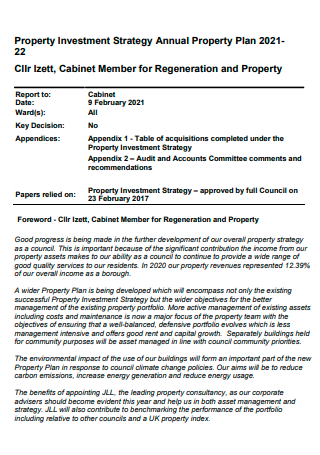
Property Investment Strategy Annual Property Plan
download now -
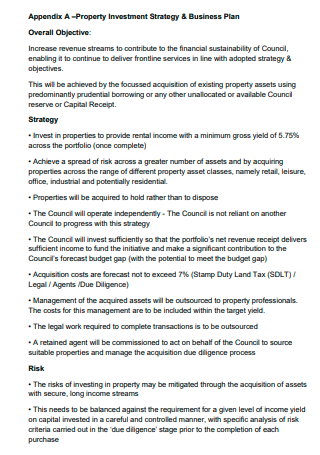
Property Investment Strategy and Business Plan
download now -
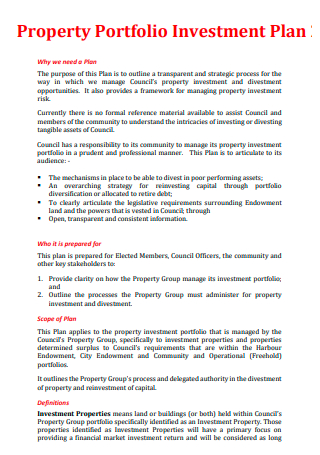
Property Portfolio Investment Plan
download now -
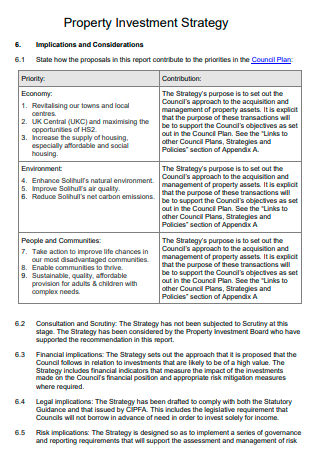
Property Investment Strategy Council Plan
download now -
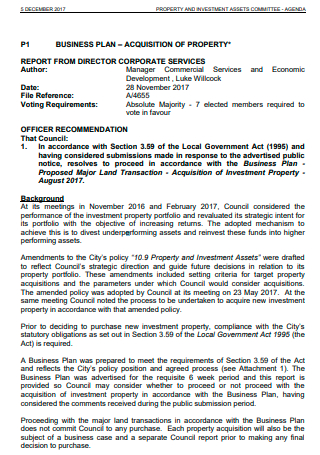
Acquisition of Property Investment Business Plan
download now -
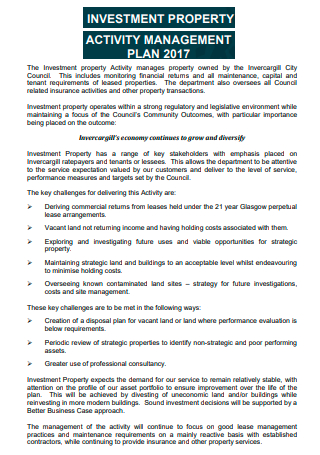
Property Investment Activity Management Plan
download now -
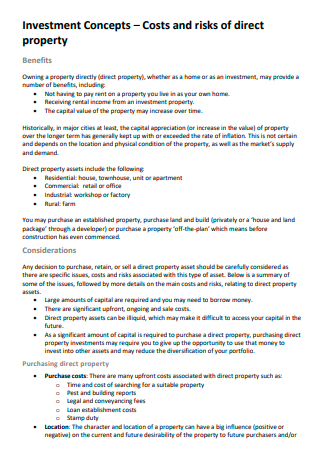
Property Investment Concepts Plan
download now -
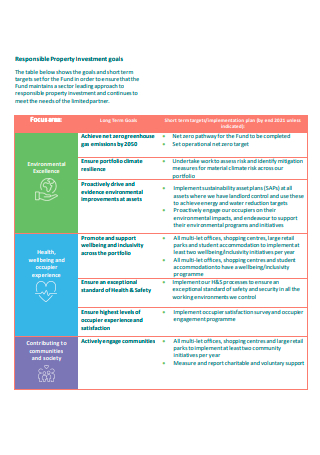
Property Investment Goals Plan
download now -
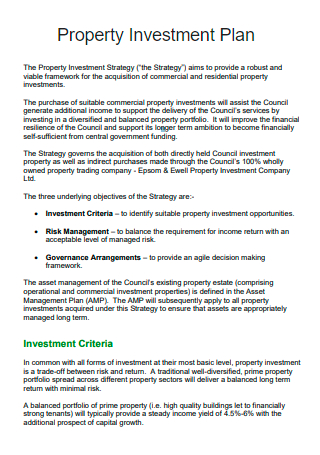
Property Investment Strategy Plan
download now
FREE Property Investment Plan s to Download
8+ Sample Property Investment Plan
What Is a Property Investment Plan?
Pros and Cons of Investing
Advantages of Creating a Property Investment Plan
Tips When Making a Property Investment Plan
FAQS
Why Is a Property Investment Plan Beneficial?
Is Investing in Real Estate Worth It?
How Do I Invest in Real Estate/Properties?
What Is a Property Investment Plan?
A property investment plan is a roadmap that details investment ideas as well as possible revenues from a property. It emphasizes the ways for earning returns on investment. It’s an extremely useful tool for possible investors or partners. The return could come from renting out the property or selling it. As a result, the predicted rental property cash flow can also be shown. It will demonstrate a perfect source of income from real estate investment, whether through sales or renting. It also includes planning for how to manage expenditures for property upgrades or maintenance. It also establishes a timetable for when the investment will pay off and money will be generated. It also describes the property’s potential as well as the appropriate market target.
Pros and Cons of Investing
We frequently weigh our options by making a list of pros and cons. Then we can discover which factors are relevant. There is always risk in each business decision. Whether it is a project investment or a property purchase investment. Factors such as the ebb and flow of market demand can play a larger impact at times. It might also be the prices of properties in specific localities. Most notably, it has the potential for growth. There are other aspects to consider, but here are some common advantages and disadvantages of investing.
PROS
CONS:
Sudden Changes in the Market: A sudden increase in interest rates or prices may cause your property to be evacuated and emptied. That is not a desirable circumstance. It will sever your financial flow and income source. However, this is a danger that all business owners and investors are aware of. It’s a combination of economic predictions and present demand. Natural calamities may also play a significant influence. Damaged properties do not appeal to potential buyers or tenants. A crisis like the COVID 19 pandemic induce a decline in property sales in metro areas’ residential real estate markets. Demand has dropped by at least 40% compared to the previous year. This is due to the housing bubble’s high-demand high-price that is hard to sustain by those who are out of work during the pandemic. While others are compelled to work from home. Unpredictable events gain fast traction and may result in losses rather than profits.
Liquidation: One of the most major drawbacks of investing in real estate is the difficulty to liquidate the property. So, if you need money right away, it could take weeks or months to sell the property and convert it to cash. As a result, it’s a terrific asset, but not for an immediate backup plan.Maintenance: Property must be maintained and repaired on a regular basis. It must meet legal requirements or you may face penalty. Most importantly, when individuals are looking for a rental property, they want a nice place. That doesn’t really tell you anything about how it’s been used or damaged. As a result, it should be well-kept. Maintenance reports should be favorable, with just little additional charges. However, it may place a strain on your money, especially if you have abusive or unpleasant tenants.Advantages of Creating a Property Investment Plan
Isn’t it wonderful to finally witness the results of your efforts? Don’t you want to see the numbers on paper come to life? Aside from satisfaction, a written document is useful for recordkeeping and reference.
Tips When Making a Property Investment Plan
When you make an investment, you are also assuming an inherent risk. Weighing the benefits and drawbacks of your existing financial condition, as well as having all of the facts in front of you, is essential. Making a risky investment in a high-demand market does not ensure success. It only increases the likelihood of an early return and exponential growth.
-
1. Be Bold
Investing money in something that does not yet exist requires guts. That’s how business is all the time. You can plan as much as you want and arrange as many contingencies as you can, but some circumstances may be beyond your control. However, when it comes to investing, you can never be too cautious either. In your eyes, the potential for enormous success may be gone as quick as it appears. Not only does your fortitude need to be visible on paper, but it should also be supported by compelling data. It should provide examples of similar situations. However, being daring is a crucial mentality for an investor. Along with wisdom and wise choices.
-
2. Check Your Current Financial Status
Before making any daring investment or considering any bold ideas, you should consider if you have the financial means to do so. This is due to the fact that it may result in more losses before it even begins. It may also force you to go into debt if it does not succeed. As previously stated, there is always a risk in investing. And there are elements over which you have no control. What you can control, though, is your own money. This includes your funds as well as other assets. It would be difficult to invest without a backup plan in case something went wrong. That is either a large sum of money or your assets are collateral. This is really required in order to minimize financial damage. Because it would also signal more monetary payback if it were not successful. If you don’t have that, you may have to take out a loan. That’s a loan on top of a loan that might quickly snowball. So be prudent with your money and where you invest it.
-
3. Check the Current Market
The market has a significant impact on the success of any business or investment. So, by researching what’s popular and hot on the market, you can zero down on the ideal property. Of course, this might also mean greater prices. However, in this scenario, it would also imply a high return. That financial bubble will continue to exist unless there is a disruption. As a result, you must seize opportunities where they present themselves. The steeper it is, the higher it is. And it is for this reason that expert predictions should be studied and accepted.
-
4. Make Investment Return and Profit Graph
It is critical to assess the risk of your investment. That is how you may prepare for a late return or a sudden loss. It also provides your investors with a bird’s-eye view of your position. That predicted graph demonstrates your ability and knowledge of the subject. Predicting when they will receive their returns and how much revenue will follow is an additional advantage. Investors wanted to see and know that money could be made. And for yourself, you could make an easy-to-follow investment tracking spreadsheets.
-
5. Secure Your Investment
Securing your investment entails two steps. One, carefully monitor and assess the property. This is to ensure that your price is proper. Two, prepare ahead of time by scouting prospective customers. That’s an efficient technique for minimizing potential loss. It ensures that there is at least one potential client present. And appropriately market your investment property. As an aid, you can devise marketing techniques for more exposure.
FAQS
Why Is a Property Investment Plan Beneficial?
A property investment strategy is vital since there is a more logical presentation of investment ideas as well as the collected related data. It can also make decisions on whether or not to use specific strategies in the future. It can also assist in demonstrating the risks as well as the advantages of the investment. Which would be extremely beneficial in persuading investors and partners.
Is Investing in Real Estate Worth It?
Investing in your own home is worthwhile. After all, the property would be in your name and under your control years later. At the same time, there is a financial risk if it is intended for immediate rental usage. Alternatively, you might renovate a house in order to sell it to a buyer. This is determined by the market as well as the abilities of real estate brokers.
How Do I Invest in Real Estate/Properties?
After you have purchased a property, you can begin investing in real estate. However, this necessitates extensive research about its current and future worth. If you intend to rent it out, you need be prepared to cover both the ongoing maintenance fees. Even if it’s just for you to own, it’s still an investment, and you must have enough money to pay it forward or in installments.
One thing is certain: investing money to own a home is always worthwhile. Whether you want to turn it into a rental property in the future. However, having a property under your name is beneficial in the long term. When things go wrong, it can act as collateral and backup. There are also several possibilities for what you can do with it. Don’t hesitate to download the above property investment plan samples and begin investing right away!
